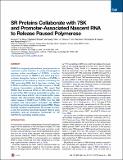SR Proteins Collaborate with 7SK and Promoter-Associated Nascent RNA to Release Paused Polymerase
Author(s)
Ji, Xiong; Zhou, Yu; Pandit, Shatakshi; Huang, Jie; Li, Hairi; Lin, Charles Y.; Xiao, Rui; Fu, Xiang-Dong; Burge, Christopher B; ... Show more Show less
DownloadBurge_SR proteins.pdf (3.934Mb)
PUBLISHER_POLICY
Publisher Policy
Article is made available in accordance with the publisher's policy and may be subject to US copyright law. Please refer to the publisher's site for terms of use.
Terms of use
Metadata
Show full item recordAbstract
RNAP II is frequently paused near gene promoters in mammals, and its transition to productive elongation requires active recruitment of P-TEFb, a cyclin-dependent kinase for RNAP II and other key transcription elongation factors. A fraction of P-TEFb is sequestered in an inhibitory complex containing the 7SK noncoding RNA, but it has been unclear how P-TEFb is switched from the 7SK complex to RNAP II during transcription activation. We report that SRSF2 (also known as SC35, an SR-splicing factor) is part of the 7SK complex assembled at gene promoters and plays a direct role in transcription pause release. We demonstrate RNA-dependent, coordinated release of SRSF2 and P-TEFb from the 7SK complex and transcription activation via SRSF2 binding to promoter-associated nascent RNA. These findings reveal an unanticipated SR protein function, a role for promoter-proximal nascent RNA in gene activation, and an analogous mechanism to HIV Tat/TAR for activating cellular genes.
Date issued
2013-05Department
Massachusetts Institute of Technology. Department of BiologyJournal
Cell
Publisher
Elsevier
Citation
Ji, Xiong, Yu Zhou, Shatakshi Pandit, Jie Huang, Hairi Li, Charles Y. Lin, Rui Xiao, Christopher B. Burge, and Xiang-Dong Fu. “SR Proteins Collaborate with 7SK and Promoter-Associated Nascent RNA to Release Paused Polymerase.” Cell 153, no. 4 (May 2013): 855–868. © 2013 Elsevier Inc.
Version: Final published version
ISSN
00928674
1097-4172